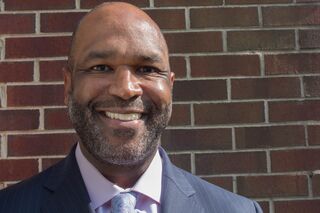Spirituality
How to Keep the Faith When Supporting Clients in Crisis
Your spiritual practice could be an important part of your self-care routine.
Posted October 5, 2020
In a series of interviews with other clinicians and colleagues of color around the country, such as Dr. Zoe Shaw in California and Monica L. Coleman in Mississippi, I asked how these professionals, who have dedicated their careers to helping others heal, maintain their own peace of mind in the midst of so much tumult in the world these days. In this column, you’ll hear from Dr. Karriem Salaam, a psychiatrist and medical director of a Philadelphia inpatient psychiatric unit for adolescents in crisis. Dr. Salaam shares how his faith plays an important role in his self-care practices.

Karriem L. Salaam, M.D., FAPA, Board Certified Adult and Child and Adolescent Psychiatrist, Clinical Assistant Professor of Psychiatry at Drexel University College of Medicine, Founding Member of Global Health Psychiatry, LLC.
What have you found to be most challenging about being a clinician in this era? As a psychiatrist caring for minors, helping families understand the role they play in the mental health challenges faced by the teenagers [can be difficult]. These problems rarely occur in isolation; they often reflect some disruption in the family system, whether it be loss of a loved one due to illness, incarceration, divorce or separation or change in family finances due to parent/caregiver job loss. It’s almost never as simple as “here, take this medication, attend this therapy and all will be well.” Often the solution to conflicts in the family system involves family therapy, and for some caregivers it is easier to scapegoat the minor’s behavior as opposed to the conflicts underlying the behavior.
What does self-care mean to you?
A set of prioritized maintenance behaviors that must be protected, defended and completed by the individual in the service of preparing the individual to function optimally in all spheres of life.
What self-care practice have you found most beneficial in these times?
Prayer for me five times daily as prescribed by my religion, the Muslim religion of Al-Islam.
In what ways(s) does this practice help you?
During prayer, I literally transfer my burdens to a power (The Creator, Almighty God) much greater than anyone could imagine, thus cleansing my mind and soul of the emotional, psychological and spiritual toxins that accumulate throughout the day. Prayer liberates my mind and soul, enhancing my ability to go into the world armored, capable and confident in the power and gifts bestowed upon me by Almighty God to be used to serve humanity.
When you can't do what's most beneficial, what's your Plan B?
No need for plan B because prayer is portable and can be done openly or silently, scheduled or spontaneously, in any location at any time. Walking and hiking outdoors with my wife is especially gratifying, the benefits include fresh air, sunlight (Vitamin D production in the skin). Also uncensored, highly stimulating conversation with my best friend and life partner in the absence of an audience.
Why is it important to have self-care practices?
These practices are a way to inject joy, comfort and certainty into our lives in these very uncertain times.


